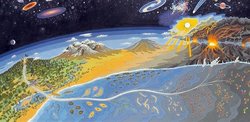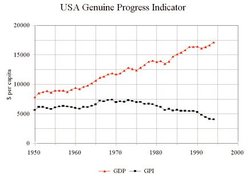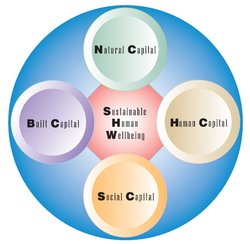Earth, Inc. Shareholder Report: Introduction
| Topics: |
“Human alteration of Earth is substantial and growing. Between one-third and one-half of the land surface has been transformed by human action; the carbon dioxide concentration in the atmosphere (Atmospheric composition and structure) has increased by nearly 30 percent since the beginning of the Industrial Revolution; more atmospheric nitrogen is fixed by humanity than by all natural terrestrial sources combined; more than half of all accessible surface fresh water (Freshwater biomes) is put to use by humanity; and about one-quarter of the bird species on Earth have been driven to extinction. By these and other standards, it is clear that we live on a human dominated planet…
Humanity's dominance of Earth means that we cannot escape responsibility for managing the planet. Our activities are causing rapid, novel, and substantial changes to Earth's ecosystems… In a very real sense, the world is in our hands—and how we handle it will determine its composition and dynamics, and our fate."
~Peter Vitousek and others, Science 25 July, 1997
Contents
Human activities on planet Earth are like a ship at sea with no one at the helm, or a corporation with no management. There is no coordinated international body empowered to manage human activity on Earth, despite the fact that our activities will determine the fate of the planet and of humanity. Perhaps there never will be such a body. In the meantime, we take it as our responsibility to inform you, the shareholders of "Earth, Inc." of the current status of human and planetary assets and liabilities, so you can hold your leaders accountable, and take action needed to secure your future wellbeing.
In the past, global economic information has been reported primarily using The United Nations (UN) System of National Accounts (SNA), which report "Gross Domestic Product" (GDP) for each country, or Gross World Product (GWP) for the whole world. The (UN) SNA as well as corporate balance sheets, focus exclusively on goods and services purchased in the marketplace to assess the wealth, health, and viability of society. By measuring GDP, or corporate profit and loss respectively, these financial accounts place no value on non-market human, social, or natural resources (Natural capital). For example, the unpaid work of parents caring for children, though crucially important, isn't counted in GDP or corporate accounts. The value of social networks and democracy, although of proven importance to wellbeing, aren't counted. Finally, crucial services of nature such as providing oxygen to breathe aren't counted either. By excluding these important assets, a dangerously incomplete view of human welfare is perpetuated.
Is Growth always good?
The most common statement heard around the world from politicians and business leaders is that we need more economic (GDP) growth. The unstated assumption is that GDP growth will increase our welfare, but is it true? GDP accounts add all costs and benefits together as economic activity. They make no distinction between expenditures on goods such as food, clothing, and shelter, or on costs such as pollution cleanup, crime, and illness. GDP accounts have no minus sign. Nothing is subtracted. This is like adding the payment and deposit columns together in your checkbook and believing the total to be meaningful. A lot of money could be going in and out, but are you ahead or behind?
GDP at the national level is equivalent to a corporation adding together gross revenues and expenditures to determine profit. Confusing expenses with revenues would be a huge accounting error at the corporate level, and adding costs and benefits together as a measurement of national welfare at the national level creates a similarly huge distortion. Just as inaccurate accounting of financial assets can lead to the collapse of corporations (e.g., Enron, WorldCom), inaccurate accounting of the Earth's assets may lead to the unexpected collapse of human welfare.
GDP has many other limitations as a measurement of welfare, even of narrowly defined economic welfare. GDP does not reveal the distribution of wealth or income in society. If 1% of the society received 99% of the income and owned 99% of the wealth, GDP accounts would tell you nothing about it. GDP doesn't reveal the mix of goods and services being produced. It doesn't tell you if the economy is making "guns or butter". It doesn't reveal the depletion of natural resources, which are counted as "growth". It reveals nothing about leisure time, social cohesion, crime, or many other important factors.
Is there an alternative to economic growth? Although in some cases it may bring more harm than good, economic growth as an economic goal has not been seriously challenged by the mainstream public, media, business, or political leaders. Yet economic development – economic improvement focused on quality of life, versus quantity of consumption – rather than economic growth may likely be a more desirable alternative as the costs of global economic growth continue to mount. In China for example, experts from the World Bank and elsewhere note that despite that nation’s rapid GDP growth, the costs associated with extreme air and water pollution, soil erosion and farmland loss, and rising health care costs due to widespread environmental degradation are wiping out many of the economic gains achieved by wide-scale industrialization and urbanization. A serious obstacle to abandoning economic growth as a goal is the current global financial and business systems are poorly suited to a “steady state” level of economic development. Dependence on growth also means that equity distribution questions can be avoided; fairness suggests the world’s poorest individuals are not trapped in a permanent state of poverty.
Alternatives to GDP
Many efforts have been made to correct the shortcomings of GDP. These include the Genuine Progress Indicator (GPI) by Redefining Progress, and the Index of Sustainable Economic Welfare (ISEW) by Herman Daly (Daly, Herman E.) and John Cobb. These studies indicate that GDP and economic welfare were correlated until about 1977 in most industrialized countries. After that date GDP has continued to rise, while economic welfare has remained constant or is declining. The graph at right clearly illustrates this point.
"Unfortunately GDP figures are generally used without the caveat that they represent an income that cannot be sustained. Current calculations ignore the degradation of the natural resource base and view the sale of non-renewable resources entirely as income. A better way must be found to measure the prosperity and progress of mankind”
- Barber Conable, former U.S. Representative (R-NY) and President of the World Bank
What is the bottom line of Earth, Inc.?
To address the shortcomings of purely market-based accounting practices, the concept of a "triple bottom line" (measuring social and environmental costs and benefits in addition to a financial bottom line) has become accepted in many businesses. The concepts of natural, human, and social "capital" have been added to "built" capital in order to provide a more complete view of the factors that contribute to human wellbeing. And, since many aspects of natural, human and social capital provide benefits not confined to a single business or country, an accurate assessment of the capacity of the ecological-economic system to create and sustain human welfare must also consider these factors at the global level. We therefore take it as the goal of Earth, Inc. to maximize human welfare and sustain it indefinitely over time.
If one views the totality of the natural world and it's human inhabitants, and look at it through the lens of a business – including its assets, liabilities, flows of goods and services, "profits", and "losses" – one can then make decisions relevant to the long-term health of the company.
Some of the basic premises of this report include:
- Everyone on earth is a shareholder in Earth, Inc.
- The assets of Earth include not only built capital (GDP, infrastructure) and human capital (knowledge, health), but also [[natural] capital] (resources, land, eco-services) and social capital (trust, volunteering, networks, democracy). We assess and describe this total asset base in terms that make clear that all four forms of capital are essential to the successful and sustained operation of Earth, Inc.
- The balance sheet and profit and loss statement would include the assets and flows of all four capital types, which would make clear whether the overall gain or loss of assets is positive or negative. For example, built and human capital may be increasing, while natural and social capital may be declining. By evaluating all four factors a better determination of overall human welfare can be made.
"Men now begin to realize what as wandering shepherds they had before dimly suspected, that man has a right to the use, not the abuse, of the products of nature; that consumption should everywhere compensate by increased production; and that it is a false economy to encroach upon a capital, the interest of which is sufficient for our lawful uses."~George Perkins Marsh, 1848
| This is a chapter from Earth, Inc. Shareholder Report (e-book). Previous: none|Table of Contents|Next: Natural Capital |


